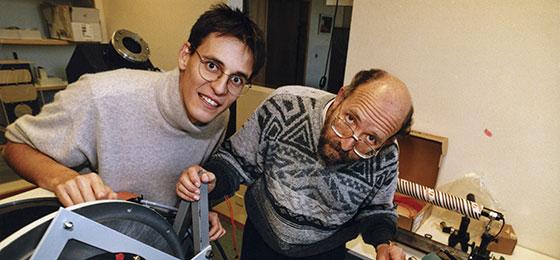How team Mayor/Queloz won the Nobel Prize

Planetary researchers Michel Mayor and Didier Queloz will tonight receive the Nobel Prize in Physics. Quotes from two courageous scientists and longstanding SNSF grant holders.
For decades, the Geneva-based astrophysicists Michel Mayor (77) and Didier Queloz (55) courageously stuck to their line of research, without any thought of practical applicability. In so doing, they revolutionised the widely accepted theory of planet formation. Tonight in Stockholm, they will be handed the Nobel Prize in Physics. Both of them welcome the high amount of attention their research field is now getting.
"The tremendous response to this Nobel Prize helps to show what is happening in basic science in Switzerland." Michel Mayor
Mixed feelings of a former doctoral student
Discovering the first exoplanet, 51 Pegasi b, did not necessarily make life easier for Queloz, then a doctoral student at the observatory of the University of Geneva.
"I made this important discovery at the very beginning of my scientific career. Personally, it became a bit of a problem. But I'm an optimist by nature, I kept going and I survived."Didier Queloz
Despite the pressure it piled on him, it was perhaps fortunate that a doctoral student and not a professor had been the first to cast an eye on the observation data.
"Michel was on sabbatical in Hawaii when I discovered the planet. My limited knowledge of planetology was what led me to believe in it from the start, which probably wouldn't have happened to Michel. And when I called him up to tell him about the discovery, I got the feeling he didn't really believe it."Didier Queloz
They both welcome the fact that this has been a team award and that it does not, as is so often the case, honour a solitary scientific hero.
"We were a very special team. Michel had the idea of measuring the speed of the stars using a completely new technique. At the same time, he granted me a lot of freedom for my work."Didier Queloz
"Today, one senses a willingness to include younger researchers in the recognition that comes with the Nobel Prize. This can give them a tremendous boost. And it is essential; some doctoral students may seem to be working on something very obscure, but their commitment could still make it take off at a later stage."Michel Mayor
Approximately 30 years after the PhD student Queloz and his thesis supervisor Mayor analysed the wavelengths of stars, the two scientists expect a lot of the young researchers following in their footsteps.
"They must be ready to push the boundaries of their discipline"Didier Queloz
"I advise young researchers to be ambitious, to do what they are interested in and to carefully choose the right place to do their thesis."Michel Mayor
Asking big questions
Between 1977 and 2014, the SNSF awarded numerous grants to the two astrophysicists, thereby paving the way for top-tier planetary research in Switzerland. The National Centre of Competence for Research (NCCR) "PlanetS" was largely Mayor's brainchild. Queloz is still actively involved in the research work of the NCCR. But is it worthwhile to study a planet that is 50 million light years away and therefore totally beyond our reach? As one, they answer:
"What would the German physicist Wilhelm Conrad Röntgen have said if someone had asked him what the point was of investigating cathode rays?"Michel Mayor
"To make a revolutionary discovery, you have to do research without thinking about any sort of application. You can go on improving steam locomotives for as long as you like, they will never take you to the moon."Didier Queloz
Their findings were initially met with a great deal of resistance.
"Our results challenged planetary theory, which is why so many astronomers were sceptical at first and didn't really believe it. It took about ten years for them to be accepted by the planetary research community."Didier Queloz
Nevertheless, for both of them the discovery was a dream come true. And not only that:
"All myths and religions ask the same questions: where do we come from? What is our place in the universe?"Didier Queloz
"This has been humanity's dream for more than 2000 years. Today, we are in a privileged position: the technology we have allows us to transform this ancient dream into what is an immensely vibrant chapter of scientific history. We can't see these planets, but we can tell they are there using stringent scientific methods."Michel Mayor